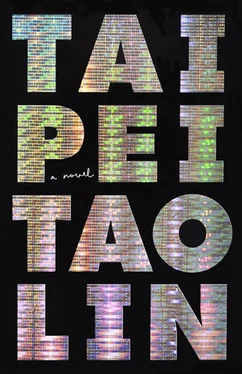“And then,” said Paul moving toward the entrance. “The performance art for world peace. Highly suggested.”
“The, um,” said Paul noticing a headset-wearing employee inside McDonald’s, looking at him suspiciously, it seemed. “The arts sector.”
“We didn’t do the drive-thru.”
“Um,” said Paul distractedly.
“One of the first, and worst, in Asia,” said Erin, and someone behind them said something that Paul didn’t comprehend. The person repeated himself. Paul turned around and the headset-wearing employee — a manager, it seemed — repeated himself again, in a sort of pleading voice.
“We aren’t,” said Paul in Mandarin. “We’re only doing video. We finished.”
The employee said “you can’t” in Mandarin and a word Paul didn’t comprehend.
“We won’t,” said Paul in Mandarin. “There’s just us two only.”
“Skype,” said Erin quietly.
“Vacation,” said Paul, and the employee looked at Erin, then Paul. They were standing where cars, after ordering, would pass to get to the pickup window.
“Oh, okay,” said the employee, and smiled a little and, after a pause, moved backward a few steps before turning around, walking away.
“Vacation,” said Paul grinning.
“Skype,” said Erin.
“We’re on vacation,” said Paul.
“Skype,” said Erin grinning, and they entered a dark, quiet, residential area of tall buildings behind McDonald’s, then briefly explored “one of the more glamorous alleyways in Taipei,” said Paul, before returning to McDonald’s “front yard,” where a young man wearing a scratched, black, melon-like helmet and thick-lensed glasses, standing at a bike rack, with two McDonald’s bags in his bike’s basket, stared carelessly into the distance as his hands, below him, fumbled idly with his bike lock, it seemed.
“The binge in action,” said Erin. “Yet another successful binge operation.”
“This is the best part of the binge. He’s imagining the nuggets. He’s already imagining his next trip. So much so that this is it. . this is the next trip.”
“The infinite loop of binge eating,” said Erin.
“We’re looking at his mental projection of himself.”
“We’re inside his brain right now.”
“We’re looking at our creator,” said Paul grinning wildly.
“Shit,” said Erin, and laughed. “That’s why he can’t move.” She noticed a few minutes later that the MacBook was “depleted,” a word they’d begun using to sympathetically reference anything that had temporarily exhausted a replenishable means.
• • •
On the way back to the apartment, to get a charger, they decided instead of a documentary to make a science-fiction movie, on the conceit that they existed because a young man in Taipei, while eating a bag of Chicken McNuggets, allowed himself (despite knowing this would definitely increase his unhappiness) to realistically imagine his next binge, when he would have two bags. Paul and Erin were constructed by the young man’s unconscious, for verisimilitude, as passersby in the peripheral vision of his imaginary next trip to McDonald’s. Their memories were not based on a concrete reality but on the meager imaginative powers — enough for only a very short-term, working memory — allotted for the “artificial intelligence” of peripheral passersby.
Paul and Erin discussed their movie in a dialogue that sometimes overlapped with their inner monologues, which they sometimes introduced to the dialogue, or abandoned to focus on the dialogue, or both externalized, like pets into a shared space, to observe. That the universe was how it was, and that certain things seemed incomprehensible, that Paul couldn’t, without increasingly unexertable amounts of effort, remember what he didn’t store outside himself, as words, in books, that remembering seemed to require as much, or much more, energy as imagining, all seemed, while on LSD, in a context of science fiction, explainable in excitingly interconnected and true-seeming ways.
At the apartment, around 1:30 a.m., they got a charger and Paul wrote a note to his mother that he and Erin were at McDonald’s or downstairs. They somehow didn’t remember they were on LSD, so didn’t discern and attribute the effects of LSD until, on their way to a different McDonald’s, crossing a street, Paul realized he was repeatedly becoming conscious of things in medias res, like the information he received from sensory perception wasn’t being processed immediately, but at a delay sometimes, resulting in microseconds to seconds of partial — but functioning — unconsciousness.
At the McDonald’s where five employees had stood outside with megaphones and banners they sat in a corner on the second floor — the only two customers on the floor — and recorded more footage, using their iPhones, for their science-fiction movie. They regularly reminded each other that the LSD would soon start weakening, as it continued intensifying, to a degree that Paul could sense the presence of a metaphysical distance, from where, if crossed, he would not be able to return, therefore needed to focus, with deliberate effort, against a default drifting in that direction. Around 4:30 a.m. they walked twelve blocks to the apartment, holding hands and concentrating on and reminding each other of the task — to walk to the apartment without getting lost or hit by a car.
They looked at the internet in a downstairs area until Paul’s parents woke, then showered and went outside to a sunny, warm morning. They lay on a suburban area of grass in front of a stadium by the apartment building, no longer excited or interested in their science-fiction movie, having forgotten or become tolerant toward its most exciting, beginning elaborations — discussed most intensely after Paul’s MacBook stopped recording. If they existed only in abstraction, as an unconscious aside in someone’s brain, this forgetting, indicative of decreasing interest, would be exactly what he would predict to happen, he weakly thought with predictably less interest and clarity, on his back, with eyes closed.
• • •
The next two times they ingested ecstasy they both felt what they termed “overdrive,” which for Paul was a whirring, metallic, noise-like presence that induced catatonia and rendered experience toneless — nullifying humor, irony, sarcasm, intimacy, meaning — so that he became like a robot that could discern (but not process, consider, or interrelate) concrete reality. Both times, after forty talkative minutes, Paul became silent and thoughtless and expressionless and suddenly disinterested in Erin and intensely — only sexually — interested in strangers and he tried masturbating in public bathrooms and couldn’t orgasm or feel pleasure, to any degree, as if lacking the concept, but felt continuously aroused “somewhere,” including sometimes, it seemed, outside his body, a few feet in front of him, or far in the distance, in a certain store or area of sky, or in an overlap, shifting in and out of his chest or head or the front of his face.
Their brand of ecstasy, Erin learned from the internet, contained MDA, which they attributed — unconvincingly, because they’d previously enjoyed the same brand — as the cause of “overdrive.”
One night, while sober, they were at a red light at a busy, quiet — unnaturally muffled, it seemed — intersection of a four-lane street and an eight-lane street, into the X of which a two-lane street asymmetrically stopped, as if the intersection had been built to memorialize where a traveler, by choice or not, had stopped going somewhere.
Paul felt an oppressive sensation of being confined by the most distant things he could see in any direction, like after Michelle had walked away and he’d stood motionless in the rain, except then there’d also been a feeling of possibility, a glimmer of eagerness as he walked over the shiny, wet street, to return to the party. In an effort to distract from this feeling he asked, somewhat unexpectedly, what Erin was thinking — they’d stopped asking because it was always something depressing — and, with a slight grin, he saw peripherally, she said she’d been thinking that Paul needed to return her, like a broken appliance to a store, because she needed to be replaced with a newer, upgraded model. Paul stared ahead, wishing she hadn’t said that. “No,” he said grinning vaguely, unsure exactly how — but suspecting strongly that — their relationship due to what she’d said had changed in some notable, irreversible manner.
Читать дальше












